Sigma Xi 2017 Student Research Showcase
Ecology & Evolutionary Biology

The Effects of Infants on Maternal Behavior in Coquerel's sifakas (Propithecus Coquereli): A Pilot Study
Amaya Watters, North Carolina State University
Gestating and lactating mothers need to consume more calories every trimester, and experience an increased number of sleep disturbances. They are also more protective and aggressive than females with no offspring (Hedman et al. 2001). In this study, the behavior of captive mother Coquerel’s sifakas (Propithecus coquereli) was examined.
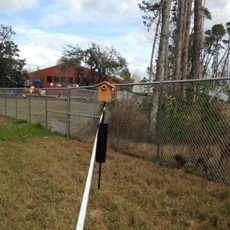 Nest-box Visibility Impacts Songbird Reproductive Success
Nest-box Visibility Impacts Songbird Reproductive Success
Brittany Bailey and Kaitlyn Zielger, Islands High School
The visibility of a nest is a crucial factor in the number of eggs per nest and the survivability of songbirds. The visibility of a nest-box can influence whether birds select that location for their reproductive event. Greater visibility can lead to increased predation and exposure to inclement weather. In this study, we observed Eastern Bluebirds (Sialia sialis) and Carolina Chickadees (Poecile carolinensis) in Savannah, Georgia.
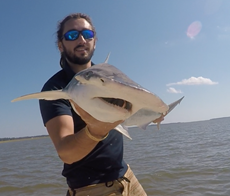 Assessing the Role of Magnetic-based Navigation in the Spatial Ecology of the Bonnethead, Sphyrna tiburo
Assessing the Role of Magnetic-based Navigation in the Spatial Ecology of the Bonnethead, Sphyrna tiburo
Bryan Keller, Florida State University
The presentation will address our methods for assessing the role of magnetic-based navigation in the spatial ecology of the bonnethead shark. The audience will also be provided with our hypotheses, findings, objectives and the broader impacts of the work.
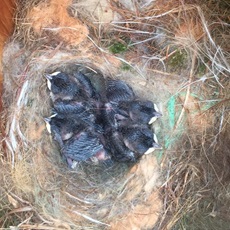 Anthropogenic Noise Impacts Reproductive Success in Songbirds in Savannah, Georgia
Anthropogenic Noise Impacts Reproductive Success in Songbirds in Savannah, Georgia
Carlee Skarin, Islands High School
Anthropogenic noise can interrupt essential songbird communication and possibly cause damage to embryos and nestlings. Anthropogenic noise negatively impacts the bird’s ability to make calls for mating and reproduction, foraging, and alerting about predation. We recorded anthropogenic noise at various breeding sites using the Decibel 10th application on an iPhone 6.
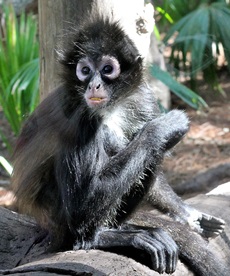 The Evolution of Spider Monkey Color Vision
The Evolution of Spider Monkey Color Vision
Cassie Vergason, Florida Institute of Technology
Match-to-sample paradigms have been used for many years to explore learned association and memory in animal species. Frequently, this is done either in an operant conditioning chamber or on a computer. Both methods rely on using two-dimensional visual stimuli. However, relatively little work has been done with match-to-sample paradigms with physical objects. We are interested in whether spider monkeys (Ateles geoffroyi; n=4) can learn a three-dimensional match-to-sample paradigm.
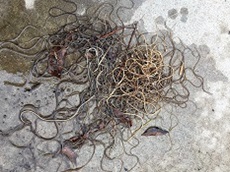 Field and Experimental Observations on a New Gordius sp. (Nematomorpha: Gordiia) with the First Documented Terrestrial Life Cycle for the Phylum
Field and Experimental Observations on a New Gordius sp. (Nematomorpha: Gordiia) with the First Documented Terrestrial Life Cycle for the Phylum
Christina Anaya, Oklahoma State University
All gordiids have complex life cycles and are considered aquatic in their free-living phase. However, recently we discovered a new Gordius sp. in Oklahoma which occurs in terrestrial habitats. My goal was to investigate the transmission aspects of Gordius robustus in Oklahoma.
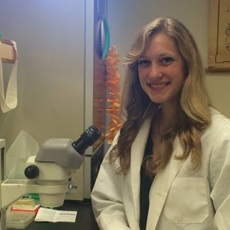 Tracking Monster Movements: Evaluating Methods of Measuring Disease Transmission
Tracking Monster Movements: Evaluating Methods of Measuring Disease Transmission
Elizabeth Reinhart, Purdue University
My study discusses the accuracy of previous transmission measurements and the implications that could have on future patterns of disease.
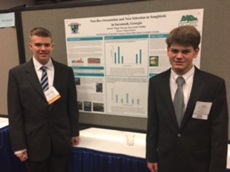 Songbirds and Nestbox Orientation
Songbirds and Nestbox Orientation
Harold Parsons and Krzysztofer Phillips, Islands High School
Many environmental factors, such as temperature and wind direction, influence nest success in songbirds. These factors influence the direction in which birds orient their nests, but vary between regions based on seasonal weather patterns. Songbirds exhibit preferences for specific directional orientations of nest boxes placed by humans.
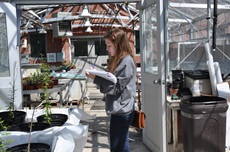 The Effects of Different Sedimentation Levels on the Growth of Taxodium distichum and Nyssa aquatica Seedlings
The Effects of Different Sedimentation Levels on the Growth of Taxodium distichum and Nyssa aquatica Seedlings
Isabel Grandy, St. Joseph's Academy
The decline of cypress forests in Louisiana is partly due to land subsidence and coastal flooding. One of the more common forms of coastal restoration is marsh land rebuilding; this technique has not been applied in coastal forests in part due to concerns of sediment addition negatively impacting trees. This project explored the impact of thin layer sediment additions on the growth of Taxodium distichum and Nyssa aquatica seedlings, the dominant species in these coastal forests.
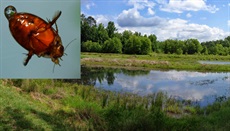 Interannual Patterns and Drivers of Dispersal in Aquatic Beetles
Interannual Patterns and Drivers of Dispersal in Aquatic Beetles
Matthew Pintar, University of Mississippi
I explore the importance of dispersal to aquatic communities, how weather drives dispersal patterns, and what this means as climate change progresses.
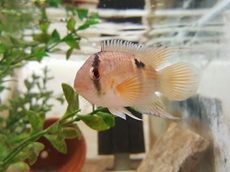 Cichlid Fry Project
Cichlid Fry Project
McKenzie Bell,David Cao, and Summer DeRobertis, California State University, Sacramento
The purpose of our research is to investigate the relationship between egg size and fry size among various species of cichlids.
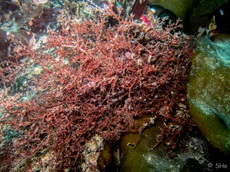 Factors Driving the Production of Defensive Secondary Metabolites in the Antarctic Red Seaweed Plocamium cartilagineum
Factors Driving the Production of Defensive Secondary Metabolites in the Antarctic Red Seaweed Plocamium cartilagineum
Sabrina Heiser, University of Alabama at Birmingham
I am currently at my field season in Antarctica until end of May. During the questioning time, I will try to check for questions as often as possible to reply in a timely manner. However, a busy field day or bad internet connection can potentially delay replies.
 The Effects of Habitat Orientation on Songbird Reproductive Success
The Effects of Habitat Orientation on Songbird Reproductive Success
William Porter, Benjamin Wood, and William Stamper, Islands High School
Reproductive success in local songbirds is affected by the orientation of nest boxes toward grass, water, and forests. The habitats near or around the nest boxes create an environment that allows the birds to be successful. The study site contained a large grassy area, three water retention ponds, and a natural mature forest around the perimeter. Nest boxes oriented toward these habitat types vary in reproductive success, as measured by the number of eggs and fledglings per nest box.
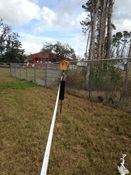 Nest-box Visibility Impacts Songbird Reproductive Success
Nest-box Visibility Impacts Songbird Reproductive Success
Brittany Bailey and Kaitlyn Zielger, Islands High School
The visibility of a nest is a crucial factor in the number of eggs per nest and the survivability of songbirds. The visibility of a nest-box can influence whether birds select that location for their reproductive event. Greater visibility can lead to increased predation and exposure to inclement weather. In this study, we observed Eastern Bluebirds (Sialia sialis) and Carolina Chickadees (Poecile carolinensis) in Savannah, Georgia.
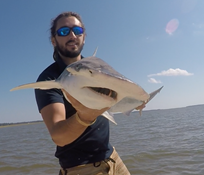
Assessing the Role of Magnetic-based Navigation in the Spatial Ecology of the Bonnethead, Sphyrna tiburo
Bryan Keller, Florida State University
The presentation will address our methods for assessing the role of magnetic-based navigation in the spatial ecology of the bonnethead shark. The audience will also be provided with our hypotheses, findings, objectives and the broader impacts of the work.
 Anthropogenic Noise Impacts Reproductive Success in Songbirds in Savannah, Georgia
Anthropogenic Noise Impacts Reproductive Success in Songbirds in Savannah, Georgia
Carlee Skarin, Islands High School
Anthropogenic noise can interrupt essential songbird communication and possibly cause damage to embryos and nestlings. Anthropogenic noise negatively impacts the bird’s ability to make calls for mating and reproduction, foraging, and alerting about predation. We recorded anthropogenic noise at various breeding sites using the Decibel 10th application on an iPhone 6.
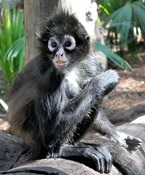 The Evolution of Spider Monkey Color Vision
The Evolution of Spider Monkey Color Vision
Cassie Vergason, Florida Institute of Technology
Match-to-sample paradigms have been used for many years to explore learned association and memory in animal species. Frequently, this is done either in an operant conditioning chamber or on a computer. Both methods rely on using two-dimensional visual stimuli. However, relatively little work has been done with match-to-sample paradigms with physical objects. We are interested in whether spider monkeys (Ateles geoffroyi; n=4) can learn a three-dimensional match-to-sample paradigm.
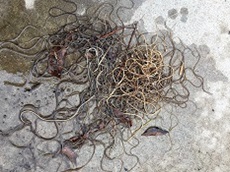
Field and Experiemntal Observations on a New Gordius sp. (Nematomorpha: Gordiia) with the First Documented Terrestrial Life Cycle for the Phylum
Christina Anaya, Oklahoma State University
All gordiids have complex life cycles and are considered aquatic in their free-living phase. However, recently we discovered a new Gordius sp. in Oklahoma which occurs in terrestrial habitats. My goal was to investigate the transmission aspects of Gordius robustus in Oklahoma.
 Nest-box Visibility Impacts Songbird Reproductive Success
Nest-box Visibility Impacts Songbird Reproductive Success
Brittany Bailey and Kaitlyn Zielger, Islands High School
The visibility of a nest is a crucial factor in the number of eggs per nest and the survivability of songbirds. The visibility of a nest-box can influence whether birds select that location for their reproductive event. Greater visibility can lead to increased predation and exposure to inclement weather. In this study, we observed Eastern Bluebirds (Sialia sialis) and Carolina Chickadees (Poecile carolinensis) in Savannah, Georgia.

Assessing the Role of Magnetic-based Navigation in the Spatial Ecology of the Bonnethead, Sphyrna tiburo
Bryan Keller, Florida State University
The presentation will address our methods for assessing the role of magnetic-based navigation in the spatial ecology of the bonnethead shark. The audience will also be provided with our hypotheses, findings, objectives and the broader impacts of the work.
 Anthropogenic Noise Impacts Reproductive Success in Songbirds in Savannah, Georgia
Anthropogenic Noise Impacts Reproductive Success in Songbirds in Savannah, Georgia
Carlee Skarin, Islands High School
Anthropogenic noise can interrupt essential songbird communication and possibly cause damage to embryos and nestlings. Anthropogenic noise negatively impacts the bird’s ability to make calls for mating and reproduction, foraging, and alerting about predation. We recorded anthropogenic noise at various breeding sites using the Decibel 10th application on an iPhone 6.
 The Evolution of Spider Monkey Color Vision
The Evolution of Spider Monkey Color Vision
Cassie Vergason, Florida Institute of Technology
Match-to-sample paradigms have been used for many years to explore learned association and memory in animal species. Frequently, this is done either in an operant conditioning chamber or on a computer. Both methods rely on using two-dimensional visual stimuli. However, relatively little work has been done with match-to-sample paradigms with physical objects. We are interested in whether spider monkeys (Ateles geoffroyi; n=4) can learn a three-dimensional match-to-sample paradigm.

Field and Experiemntal Observations on a New Gordius sp. (Nematomorpha: Gordiia) with the First Documented Terrestrial Life Cycle for the Phylum
Christina Anaya, Oklahoma State University
All gordiids have complex life cycles and are considered aquatic in their free-living phase. However, recently we discovered a new Gordius sp. in Oklahoma which occurs in terrestrial habitats. My goal was to investigate the transmission aspects of Gordius robustus in Oklahoma.
 Nest-box Visibility Impacts Songbird Reproductive Success
Nest-box Visibility Impacts Songbird Reproductive Success
Brittany Bailey and Kaitlyn Zielger, Islands High School
The visibility of a nest is a crucial factor in the number of eggs per nest and the survivability of songbirds. The visibility of a nest-box can influence whether birds select that location for their reproductive event. Greater visibility can lead to increased predation and exposure to inclement weather. In this study, we observed Eastern Bluebirds (Sialia sialis) and Carolina Chickadees (Poecile carolinensis) in Savannah, Georgia.

Assessing the Role of Magnetic-based Navigation in the Spatial Ecology of the Bonnethead, Sphyrna tiburo
Bryan Keller, Florida State University
The presentation will address our methods for assessing the role of magnetic-based navigation in the spatial ecology of the bonnethead shark. The audience will also be provided with our hypotheses, findings, objectives and the broader impacts of the work.